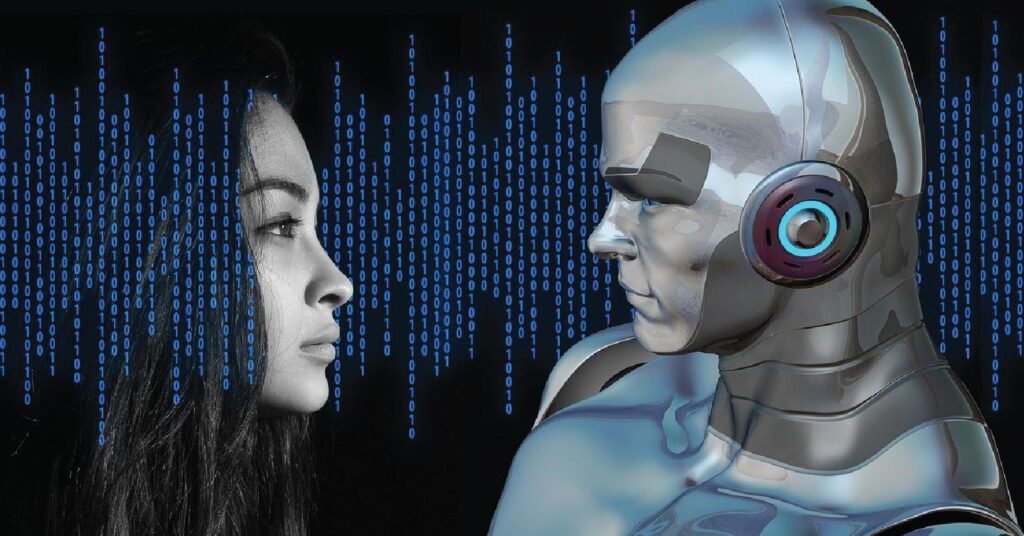In recent years, the rapid advancement of artificial intelligence (AI) and robotics has sparked both excitement and apprehension. As technology continues to evolve at an unprecedented pace, questions about the potential replacement of humanity by AI loom large. This article delves into the multifaceted debate surrounding this issue, considering the impact on various aspects of daily life, including defense, trade, economy, and employment. While AI promises unprecedented advancements, it’s essential to examine its pros and cons and ponder the irreplaceable importance of human existence in maintaining a delicate balance.
The Pros and Cons of AI and Humanity: A Delicate Balance
Advantages of AI
AI and robotics have ushered in an era of unparalleled efficiency and precision. Machines equipped with advanced algorithms can perform tasks with minimal errors, leading to enhanced productivity in sectors like manufacturing, healthcare, and logistics. Automation also allows for the execution of repetitive tasks without the need for breaks, leading to increased output and cost savings.
Drawbacks of AI
One of the most significant limitations of AI lies in its inability to replicate human emotions and creativity. While machines can process vast amounts of data and make decisions based on patterns, they lack the intuitive understanding that comes naturally to humans. This deficiency is evident in professions that require empathy, such as healthcare and counseling, where the human touch is indispensable.
Advantages of Humanity
Human beings possess an innate ability to understand complex emotions, offering comfort, support, and creative problem-solving that AI can’t replicate. The depth of human emotional intelligence plays a vital role in fields like therapy, negotiation, and leadership, where the nuance of human interaction is paramount. Additionally, humans have an inherent capacity to adapt to unforeseen circumstances, making them invaluable in situations that require flexibility and improvisation.
Drawbacks of Humanity
Despite their strengths, humans are susceptible to cognitive biases and limitations. Biases can impact decision-making in fields like law enforcement and hiring, leading to potential injustices. Furthermore, humans experience fatigue, affecting their performance in high-stress, continuous tasks. This limitation contrasts with machines’ ability to operate tirelessly.
Impact on Various Aspects of Daily Life
Defense and Security
The integration of AI in defense and security operations offers increased accuracy in threat detection, cyber warfare, and surveillance. Autonomous drones and intelligent surveillance systems can analyze vast amounts of data and respond swiftly to potential risks. However, the growing reliance on AI in warfare raises ethical concerns about the potential for autonomous decision-making in life-or-death scenarios, without human moral judgment.
Trade and Economy
AI-powered algorithms have revolutionized trading and economic forecasting. High-frequency trading systems execute transactions at speeds impossible for humans, potentially leading to market instability. While AI can optimize supply chains, reducing costs and waste, there’s also the risk of job displacement in industries that depend on manual labor.
Employment
The rise of automation and robotics has triggered debates about job displacement. Routine tasks are increasingly being automated, leading to concerns about unemployment and the need for reskilling. On the flip side, AI has the potential to create new job opportunities in fields like AI development, maintenance, and ethical oversight.
The City of the Future: AI’s Impact on Urban Development
Smart Cities and Resource Optimization
AI-driven smart city technologies promise resource optimization, energy efficiency, and improved urban planning. Traffic management, waste disposal, and energy distribution can be streamlined using data-driven insights. However, the development of such infrastructure requires careful consideration of privacy, data security, and the potential for exacerbating existing social disparities.
The Importance of Maintaining the Balance
Humanity’s Role in Ethical Decision-making
AI lacks the capacity for moral reasoning that humans possess. Ensuring ethical considerations are accounted for in AI systems requires human intervention. As technology evolves, safeguarding against biased algorithms and unintended consequences remains a paramount responsibility.
The Intrinsic Value of Human Experience
Human existence is characterized by experiences that go beyond mere data and calculations. Creativity, emotions, and personal connections contribute to the richness of life. The pursuit of knowledge, art, and culture is uniquely human and cannot be replicated by machines.
Conclusion: Embracing Synergy for a Harmonious Future
The debate over whether AI will replace humanity is complex and multifaceted. Both AI and humanity bring unique strengths and weaknesses to the table. Instead of pitting one against the other, embracing a symbiotic relationship could lead to remarkable advancements while preserving the intrinsic value of human experience. It’s crucial to harness the power of AI for the betterment of society while ensuring that ethical considerations and the irreplaceable qualities of humanity are upheld. Ultimately, the future lies in finding a harmonious balance between the capabilities of AI and the essence of human existence.
STEM Education for a Better Tomorrow
Educating the youth in STEM (Science, Technology, Engineering, and Mathematics) is paramount. STEM education equips young minds with essential skills required for the 21st century. Problem-solving, critical thinking, creativity, and collaboration are nurtured through STEM, enabling students to thrive in an increasingly technology-driven society.
As the era of AI and automation approaches, preparing the coming generation with a comprehensive understanding of the benefits and challenges posed by these advancements is crucial. By providing them with a solid foundation in STEM, we empower them to become informed and responsible innovators who can shape the future positively.
India STEM Foundation recognizes the significance of this education revolution and is actively contributing to it through various impactful programs. Robo Siksha Kendra, Gyanoday, Sanrachna, and Anusikshan are initiatives designed to foster STEM learning and application from an early age. These programs offer hands-on experiences, exposure to real-world challenges, and opportunities to harness technology to solve problems.
By engaging with ISF, individuals can become a part of this transformative movement and help in creating a future-ready workforce that not only embraces AI and automation but also navigates their ethical and practical implications. Together, we can prepare the youth to be active contributors to innovation, thereby ensuring a harmonious integration of technology and humanity for a better tomorrow.




